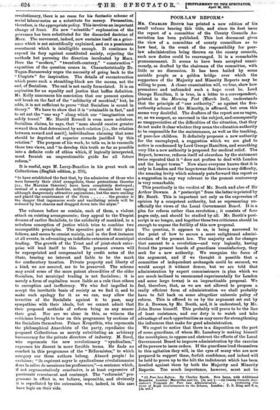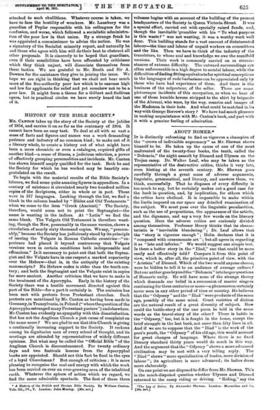POOR-LAW REFORM.*
Mn. CHAULB8 BOOTH has printed a new edition of his small volume bearing this title, and since its first issue the report of a committee of the County Councils As- sociation has been published. This last document gives the view of a committee of county councillors as to how best, in the event of the responsibility for poor- law administration being thrown on the county councils, such new duties could be rearranged. It is a remarkable pronouncement. It seems to have been accepted unani- mously, as drafted by the chairman of the committee, with little or no discussion. It has been hailed by some amiable people as a golden bridge over which the supporters of the Majority and Minority Reports may be willing to pass. A closer examination will, we fear, show how premature and unfounded such a hope must be. Lord George Hamilton, it is true, in a letter to a correspondent, printed in the Morning Post (March 2nd), understands that the principle of " one authority," as against the five- authority scheme of the Minority, is affirmed, but even this seems very doubtful. The drafters of the report are so vague, or, as we suspect, so unversed in the subject, and consequently so unappreciative of the difficulties of the situation, that they do not make it clear whether they mean the education authority to be responsible for the maintenance, as well as the teaching, of poor-law children. It definitely proposes a new authority for the unemployed, a suggestion which we are glad to notice is condemned by Lord George Hamilton, and something very like a new authority is proposed for medical relief. The Report, however, reduces itself ad absurdunt by the statement twice repeated that it " does not profess to deal with London and the larger towns." Now since everyone knows that it is only in London and the large towns that there is any difficulty, the amazing levity which solemnly puts forward this report as a suggestion in any way relevant to the present controversy is very remarkable.
This practically is the verdict of Mr. Booth and also of Sir Arthur Downes. A " postscript " from the latter is printed by Mr. Booth. This is important not only as the expression of opinion by a competent authority, but as representing un- officially the views of the Local Government Board. It is a plea for reform rather than revolution ; it consists of four pages only, and should be studied by all. Mr. Booth's post- script is no longer, and together these two criticisms should be enough to expose the futility of this new proposaL
The question, it appears to us, is being narrowed to the point of how to secure a more enlightened admini- stration of the present law. The majority ask for changes that amount to a revolution—and very logically, having found the present boards of guardians unsatisfactory, they seek for a new authority. We recognise the force of the argument, and if we thought it possible that a committee of independent archangels could be secured, we would accept it without demur, but we are told that administration by expert commissioners (a plan which we are much inclined to recommend experimentally for London and some large towns) is an impracticable proposal. We feel, therefore, that, as we are not allowed to propose a really efficient form of administration we shall probably have to fall back on some altogether unheroic policy of reform. This is offered to us by the argument set out by Sir A. Downes, by Mr. Booth, and, it is understood, by Mr. John Burns himself. This probably will prove to be the line of least resistance, and our duty is to watch and take advantage of such opportunities as may occur for strengthening the influences that make for good administration.
We regret to' notice that there is a disposition on the part of some guardians, of whom Mr. Lansbury is making himself the mouthpiece, to oppose and obstruct the efforts of the Local Government Board to improve administration by the exercise of its powers to issue orders. If the guardians lend themselves to this agitation they will, in the eyes of many who are now prepared to support them, forfeit confidence, and indeed will be held to prove up to the hilt the indictment which has been levelled against them by both the Majority and Minority Reports. Too much importance, however, must not be
• (1) Poor Law Reform. By Charles Booth. New Issue, with Additional Bemarls. London: Macmillan and Co. {11. net.]—(2) Coality Councils Asso- ciation's Proposals for Poor Law Administration , . . . containing also views of Royal Commissioners on the Scheme. London: I'. B. King and &Ai.
De. net.1 attached to such ebullitions. Whatever course is taken, we have to face the hostility of wreckers. Mr. Lanrsbury was a guardian of Poplar responsible with his colleagues for the confusion, and worse, which followed a socialistic administra- tion of the poor law in that union. By a strange freak he was appointed a commissioner to advise the nation. He was a signatory of the Socialist minority report, and naturally he and those who agree with him will do their best to obstruct all other proposals. It is sincerely to be hoped that guardians, even if their sensibilities have been affronted by criticisms which they think unjust, will dissociate themselves from these tactics. We are grateful to Mr. Booth and Sir A. Downes for the assistance they give in joining the issue. We hope we are right in thinking that we shall not hear much more of the five-authority poor law which is to canvass high and low for applicants for relief and yet somehow not to be a poor law. It might form a theme for a Gilbert and Sullivan opera, but in practical circles we have surely heard the last of it.



























































 Previous page
Previous page